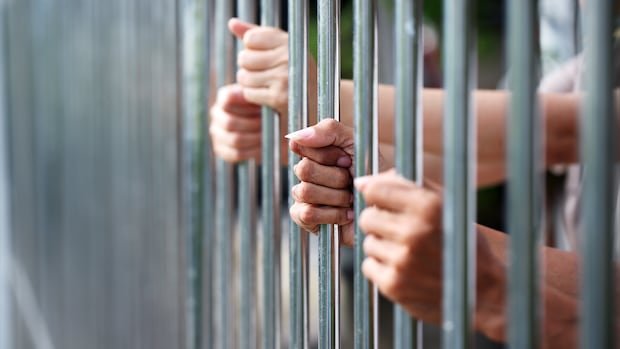An 18-year-old with severe fetal alcohol spectrum disorder accused of bailing out the drivers of a stolen truck was among those denied release during recent bail hearings in Winnipeg.
The court heard the man, who started drinking when he was eight, was waiting to arrange a community support meeting when he was arrested in September, and also had a probation order banning him from being in the driver’s seat of a vehicle, after being convicted of similar offences.
A judge denied the man bail, saying that while he had empathy for his situation, “it’s a risk analysis,” and even the ankle monitor proposed by the man’s attorney “is not going to resolve his impulsivity,” which the court found is common among people with FASD.
“If he decides to go steal a car, he is capable of doing it, and he has done it.”
CBC News went to bail court to find out more about who is free, who is not, and why.
During two days of hearings in Winnipeg’s two bail courtrooms, seven defendants appeared on screen from custody, as a judge listened to lawyers argue why each person should or should not be released as their case moves through the courts.
Of those seven, only two who requested bail were released.
The hearings come amid growing calls for changes to bail, which recently culminated in the federal government. announcing legislation designed to make it more difficult to obtain, especially for repeat and violent offenders.
But lawyers on both sides of the courtroom in Manitoba say recent calls for reform largely overlook the real problems: from the volume of cases going through the system that strain judicial resources, to the complex social issues that are often behind the crimes that land people in custody.
“It works much more often than it doesn’t”
Issues like mental illness, addiction, homelessness and cognitive challenges like FASD come up often in bail court, and a senior Manitoba Crown lawyer said from what he’s seen, there isn’t enough support in the community to help those people.
“We’re even less prepared to deal with it” in bail court, Paul Cooper said.
“We treated him according to the law,” said Cooper, who also teaches bail courses to other prosecutors.
“‘Is this person a threat? Well, then I guess we have to keep them in custody. Are they manageable? Then we can release them.’ Those are really the only options we have.”
And while stories of people out on bail arrested for new crimes have made headlines“The vast majority of what you don’t see are things that just work as they should,” he said.
“From our point of view, what we do is always guided by public safety. It’s really the single key aspect of any analysis that we do when we review a file,” Cooper said.
“Does it always work? Of course not, but it works a lot more often than it doesn’t.”
Reed Sitarik, a defense lawyer in Winnipeg who handles her firm’s daily bail docket, said what she sees in those courtrooms most often are people rearrested for violating their release conditions, not for committing new crimes.

And for many of them, struggles like homelessness and addictions are often what puts them there and what makes it difficult for them to put together a proper bail plan, making it difficult for them to get out.
“I think the calls for bail reform really target the wrong issues,” Sitarik said.
“It disadvantages people who have mental health issues. It disadvantages people who have addictions and people who are homeless or struggling with poverty, and those are people we should be trying to support.”
‘Support, not jail’
During another recent bail hearing, a former paralegal who struggled with alcohol addiction was accused of repeatedly violating a court order prohibiting her from contacting her mother if she had been using drugs or alcohol.
She said she did not have the phone number of the person she would live with if she was released.
“What he needs now is support, not jail,” defense lawyer Ijeoma Ofokansi said of his client, whose record, the court heard, included only one conviction – for drink-driving.
But the judge also denied her bail, saying he was dissatisfied with her plan, largely because he could not confirm that the person she said she would live with would be able to take her in.
Defense lawyer Sitarik said it is a common theme in bail courts.
“There’s probably not a week that goes by that I don’t encounter someone who doesn’t have an address,” Sitarik said, and in some cases, having no better options, lawyers propose that a person be turned over to a shelter.
“And that’s not a very good bail plan.”
In another case, a homeless man with mental health issues, accused of acting aggressively at Winnipeg’s Victoria Hospital after being admitted with chest pain, was denied bail, shortly after he also attempted to enter restricted areas at the city’s St. Boniface Hospital.
“At first glance, this is a person who is in trouble causing chaos in a health care setting,” the judge said, but the man’s extensive criminal record and previous convictions for similar incidents tell a different story.
“In the context of your history, this is a chronic problem,” the judge said. “I sentenced him just last month for a very similar problem.”
During another bail hearing, a former gang member was accused of being involved in an attempted robbery in Winnipeg that ended with a co-accused shooting the victim in the back. The man was also allegedly seen high-fiving the accused shooter as they fled together in a taxi.
The court heard the man had cognitive limitations, grew up in the care of child welfare services and frequently consumed alcohol in his early life.
His lawyer proposed a bail plan under which he would abstain from drinking, observe a curfew and contact the Manitoba Addictions Foundation within two days of his release.
However, a judge determined he was “too great a risk to be released, despite the bail plan,” in part because of his criminal record, which included convictions for weapons, drugs, assaults and failure to comply with court orders.
‘Get that advice’
Only two people of the seven whose bail hearings occurred when CBC News was in court were granted freedom.
Both were charged with domestic violence and had bail plans that included adhering to a curfew, not contacting the complainant, and living with a family member or on a dry reservation to address their risk factors.
In one case, a 22-year-old man with significant alcohol problems was accused of assaulting an intimate partner and threatening to kill her if she called the police, allegations he denied.
The court heard information that the man underwent an evaluation at the Manitoba Addiction Foundation and planned to live with his father, who does not keep alcohol in his home.
“All I can suggest to you is that if I give you this opportunity to be back in custody, that you…get counseling, so you don’t end up in custody again,” the judge told the man.
“Because unfortunately, with your record, if you appear in court again, the judge will not be able to let you out.”
Less conditions, more resources
Both Prosecutor Cooper and defense lawyer Sitarik said one of the biggest challenges Manitoba’s bail courts face is the large number of cases they have to deal with and the lack of time and resources they have to do so. a recently raised problem by the union that represents the province’s prosecutors.
Sitarik said more time and resources for working on bail could help attorneys come up with more personalized plans, rather than relying on standard conditions like curfews. Better plans could reduce the number of people returning to court “for breaches of conditions that perhaps weren’t very relevant to the charges they faced.”
For Cooper, developing more specialized bail resources to respond to the complex social problems that attorneys see in court could help ease the strain on the system and help keep more accused people from ending up in court again.
As calls grow to make it harder for some to be released, related to concerns about people reoffending while on bail, he said he can’t think of any system “that eliminates the variable that is people.”
“Unless you go to a 100 percent detention system, there’s really nothing that can eliminate a level of risk,” Cooper said.
And while adding more specialized bail resources would likely require more court resources (and money), Cooper said making changes that would mean people accused of crimes would be jailed by default “would require about 10 times more resources.”
“And that’s not a society I want to live in,” he said.
An 18-year-old with severe fetal alcohol spectrum disorder accused of bailing out the drivers of a stolen truck was among those denied release during recent bail hearings in Winnipeg. CBC News was there to learn more about who gets released, who doesn’t and why.










